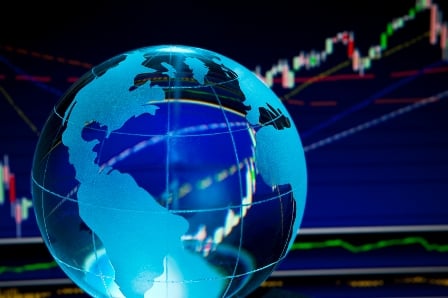Global awareness is changing the game for commodities traders writes Michael Yeung, and it’s up to Canadian to leverage it to move beyond their home bias

Canadians may be used to wild winter weather, but even the most resilient among us felt the effects of January’s frigid temperatures brought on by the polar vortex. With temperatures hitting near-record lows, Canadians and their neighbours to the south cranked up the heat, using record amounts of natural gas .
In the weeks building up to the polar vortex, Canadians and Americans alike prepared for the incoming freezing temperatures, ensuring they had enough food, blankets, and supplies to ride out the icy blast. While most were concerned with staying warm, some commodities traders prepared by speculating on short term natural gas futures
During the week of January 13-19, when reports of the polar vortex’s imminent arrival made national news across the U.S. and Canada, we noticed an increase of as much as 200% in trading volume on natural gas futures. Following that, there was another spike of up to 150% of short trades on natural gas the week the vortex actually struck.
While nearly every year we see a big spike in trading volume in November as Canada prepares for several months of sub-zero temperatures, spikes like this one make it clear that traders are watching the weather forecast, and using it to determine which trades to make.
We wondered, if traders are using the weather forecast to inform their trades in natural gas, how else are they using the news to guide their trading strategy?The weather, trade, and major events in politics all have an impact on trading volumes. For exampleduring the 2016 election, as rhetoric surrounding the southern border heated up, and talks of a border wall gained more and more attention, trading activity on the Peso spiked. As NAFTA talks escalated, so did another spike in activity on the Peso.
On the other side of the Atlantic, activity on the Pound ebbs and flows alongside each vote in parliament and as each new deadline concerning Brexit is set and then passes.
It seems obvious that traders would watch the news surrounding the commodities and currencies they are trading in. But what it tells me is that being a commodities trader in Canada requires a high level of global awareness.
Many Canadians tend to stick close to home when they invest in commodities; after all, Canada is a country rich in natural resources. But what this data is telling us is that a globally aware investor can reap the benefits of that knowledge, especially when it comes to the commodities that might not immediately come to mind.
Take orange juice, for example. Up until recently, Florida was the orange juice king. Brazil however, has recently dethroned the U.S. state and become the runaway leader in orange juice production, now producing roughly 50% of the orange juice bottled by major companies such as Tropicana. It may seem like a minor export relatively speaking, but it is still a $1.4 billion industry. There is money to be made in orange juice, if you know where to look.
For Canadians, who can be guilty of “home bias” geared towards the oil and gas, lumber, and even canola industries, this type of global awareness that takes in the events affecting these countries – whether it be political or weather-related, or anything else – can give investors a real leg up.
The advent of online trading platforms, not to mention online news, has made it much easier to trade in natural gas, orange juice, or any other commodity. It can be difficult for typical investors to get their hands on some of these commodities and currencies, but with futures and derivative products, they can leverage what they are seeing on the TV, in the newspaper, and online to capitalize on moves in the commodities space.
There’s always news, and volatility is only rising; it’s becoming more and more important for Canadian investors to find a way to diversify their exposure, and use the news flow to continue to make money when equities are crashing.
As the world becomes more and more connected, Canadians will gain access to information on commodities which previously would have been outside their realm of expertise and be able to diversify their exposure in the commodities space away from the traditional heavy focus on oil and gas, into a much more global range of products.


